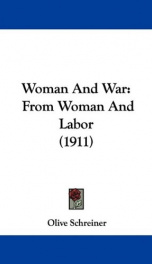Schreiner Olive

Olive Schreiner (24 March 1855 - December 11, 1920), was a South African author, pacifist and political activist. She is best known for her novel The Story of an African Farm, which has been acclaimed for the manner it tackled the issues of its day, ranging from agnosticism to the treatment of women. Olive Emilie Albertina Schreiner (1855-1920) was named after her three older brothers, Oliver (1848-1854), Albert (1843-1843) and Emile (1852-1852), who died before she was born. She was the ninth of twelve children born to a missionary couple, Gottlob Schreiner and Rebecca Lyndall at the Wesleyan Missionary Society station at Wittebergen in the Eastern Cape, near Herschel in South Africa. Her childhood was a harsh one as her father was loving and gentle, though unpractical; but her mother Rebecca was intent on teaching her children the same restraint and self-discipline that had been a part of her upbringing. Olive received virtually all her initial education from her mother who was well-read and gifted.[clarification needed] Her eldest brother Fred (1840-1901) was educated in England and became headmaster of a school in Eastbourne. When Olive was six, Gottlob transferred to Healdtown in the Eastern Cape to run the Wesleyan training institute there. As with so many of his other projects, he simply was not up to the task and was expelled in disgrace for trading against missionary regulations. He was forced to make his own living for the first time in his life, and tried a business venture. Again, he failed and was insolvent within a year. The family lived in abject poverty as a result. However, Olive was not to remain with her parents for long. When her older brother Theophilus (1844-1920) was appointed headmaster in Cradock in 1867, she went to live with him along with two of her siblings. She also attended his school and received a formal education for the first time. Despite that, she was no happier in Cradock than she had been in Wittebergen or Healdtown. Her siblings were very religious, but Olive had already rejected the Christianity of her parents as baseless and it was the cause of many arguments with her family. Therefore, when Theo and her brother left Cradock for the diamond fields of Griqualand West, Olive chose to become a governess . On the way to her first post at Barkly East, she met Willie Bertram, who shared her views of religion and who lent her a copy of Herbert Spencer’s First Principles. This text was to have a profound impact on her. While rejecting religious creeds and doctrine, Spencer also argued for a belief in an Absolute that lay beyond the scope of human knowledge and conception. This belief was founded in the unity of nature and a teleological universe, both of which Olive was to appropriate for herself in her attempts to create a morality free of organized religion. After this meeting, Olive travelled from place to place, accepting posts as a governess with various families and leaving them because of the sexual predation of her male employers in many cases. During this time she met Julius Gau, to whom she became engaged under doubtful circumstances. For whatever reason, their engagement did not last long and she returned to live with her parents and then with her brothers. She read widely and began writing seriously. She started Undine at this time. However, her brothers’ financial situation soon deteriorated, as diamonds became increasingly difficult to find. Olive had no choice but to resume her transient lifestyle, moving between various households and towns, until she returned briefly to her parents in 1874. It was there that she had the first of the asthma attacks that would plague her for the rest of her life. Since her parents were no more financially secure than before and because of her ill-health, Olive was forced to resume working in order to support them. Over the next few years, she accepted the position of governess at a number of farms, most notably the Fouchés who provided inspiration for certain aspects of The Story of an African Farm, which she published under the pseudonym Ralph Iron, as well as a small collection of stories and allegories called Dream Life and Real Life. However, Olive’s real ambitions did not lie in the direction of writing. She had always wanted to be a doctor, but had never had enough money to pay for the training. Undaunted, she decided that she would be a nurse as that did not require her to pay anything. By 1880, she had saved enough money for an overseas trip and she applied to the Royal Infirmary in Edinburgh in Scotland. In 1881, she traveled to Southampton in England. Once there, she was never to realize her dream of becoming a medical practitioner, as her ill-health prevented her from completing any form of training or studying. She was forced to concede that writing would and could be her only work in life. Despite that, she still had a passion to heal society’s ills and set out to do with her pen what she could not with pills. Her Story of an African Farm was acclaimed for the manner it tackled the issues of its day, ranging from agnosticism to the treatment of women. It was also the cause of one of her most significant and long-lasting friendships, as the renowned sexologist Havelock Ellis wrote to her about her novel. Their relationship soon developed beyond intellectual debate to a genuine source of support for Schreiner. She finally met him in 1884 when she went with him to a meeting of the Progressive Organisation, a group for freethinkers to discuss political and philosophical views. This was one of a number of radical discussion groups to which she was to belong and brought her into contact with many important socialists of the time. In addition to the Progressive Organisation, she also attended meetings of the Fellowship of the New Order and Karl Pearson’s Men and Women’s Club, where she was insistent on the critical importance of woman’s equality and the need to consider men as well as women when looking at gender relationships. However, her own relationships with men were anything but happy. She had refused a proposal from her doctor, Bryan Donkin, but he was irritatingly persistent in his suit of her. To make matters worse, despite her reservations about Karl Pearson and her intentions just to remain his friend, she soon conceived an attraction for him. He did not reciprocate her feelings, preferring Elizabeth Cobb. In 1866, she left England for the Continent under something of a cloud, traveling between Switzerland, France and Italy before returning to England. During this time, she was tremendously productive, working on From Man to Man and publishing numerous allegories. She also worked on an introduction to Mary Wollstonecraft’s A Vindication of the Rights of Women. Given the situation in England, it is perhaps unsurprising that Olive chose to return to South Africa, sailing back to Cape Town in 1889. The return home was unsettling for her – she felt extremely alienated from the people around her, but at the same time experienced a great affinity for the land itself. In an attempt to reconnect with her surroundings, she became increasingly involved in local politics as well as produced a series of articles on the land and people around her, published posthumously as Thoughts on South Africa. Her involvement with Cape politics led her into an association with Cecil John Rhodes, with whom she would soon become disillusioned and against whom she would write her bitterly satirical allegory Trooper Peter Halket of Mashonaland. This disillusionment began with his support of the “strop bill” that would allow black and coloured servants to be flogged for relatively small offenses. Her opposition to the “strop bill” also brought her into contact with Samuel Cronwright, a politically-active farmer. They were of the same mind on the “Native Question” and on Rhodes, and Olive soon fell in love with him. During a brief visit to England in 1893, she discussed the possibility of marrying him with her friends, although she was concerned that she would find marriage restrictive. She put aside these doubts, however, and they were married in 1894, after which they settled at Cronwright’s farm. The next few years were difficult and unsettled ones for them. Olive’s worsening health forced the couple to move constantly, while her first and only child died within a day. This loss was only worsened by the fact that all her other pregnancies would end in miscarriages. However, she found solace in work, publishing a pamphlet with her husband on the political situation in 1896 and Trooper Peter Halket of Mashonaland the next year. Both of these isolated her from her family and the people around her, and she was given to long spells of loneliness during that period of her life. In 1898, the couple moved to Johannesburg for health reasons. In the aftermath of the Jameson Raid, they were seen as the champions of the Republican cause in the face of the inevitable war between Boer and British. Olive tried to persuade South African officials to turn away from the path of war, and, when that failed, wrote The South African Question by an English South African in an attempt to open the English public’s eyes to the reality of the situation. That was equally unsuccessful, but Olive was undaunted. Throughout the war, she continued to defend Boer interests and argue for peace as did her brother William Philip Schreiner, although she was suffering physically and psychologically and all her efforts only met with ridicule. As a means of distraction, she began reworking the “sex book” she had started in England into Woman and Labour, which is the best expression of her characteristic concerns with socialism and gender equality. The last few years of Olive’s life were marked by ill-health and increasing sense of isolation. Despite this, she still engaged in politics and was determined to make her mark on new constitution, especially through a work like Closer Union. In this polemic, she argued for more rights not only for blacks but also for women. She also joined the newly-founded Cape Branch of the Women’s Enfranchisement League in 1907, becoming its vice-president. However, she refused to lend her support to it any longer when other branches wished to exclude black women from the vote.
do you like this author?
What readers are saying
What do you think? Write your own comment on this book!
write a commentWhat readers are saying
What do you think? Write your own comment on this author!
write a commentBook list
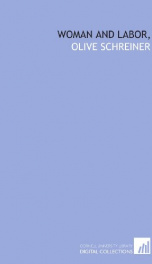
woman and labor
Series:
Unknown
Year:
Unknown
Raiting:
5/5
Olive Emilie Albertina Schreiner, a South African writer and political activist, is well remembered as an eloquent spokesman for feminist and pacifist causes. Woman and Labour, published in 1911, are the notes for her feminist credo, which quickly developed into the “bible” of the early-20th-century feminist movement. The author examines the social changes engendered by technological progress and advocates new and expanded roles for women, including a departure from the customary dependence on men for support and well-being.
Show more
add to favoritesadd In favorites
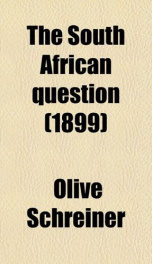
the south african question
Series:
Unknown
Year:
Unknown
Raiting:
5/5
Purchase of this book includes free trial access to www.million-books.com where you can read more than a million books for free. This is an OCR edition with typos. Excerpt from book: THE SOUTH AFRICAN QUESTION. Many views have found expression in the columns of papers during the last weeks. The working man only a few weeks or months from England has expressed his opposition to those stratagems with war for their aim which would leave him without the defence he has at present from the pressure of employers. Journalists only a few years, months, or weeks from Europe, have written, not perhaps expressing a desire for war, but implying it might be well if the wave swept across South Africa, and especially across that portion which is richest in mineral wealth, and, therefore, more to be desired. South Africans and men from Europe alike have written deprecating war, because of the vast suffering and loss it would occasion to individuals. Dutch and English South Africans have written (as one in an able and powerful letter dated from Vrededorp, which appeared a few days ago) proving the injustice that would be inflicted on the people of Africa, the violation of treaties and trust. But, amid all this chorus of opinion there is one voice which, though heard, has not yet been heard with that distinctness and fulness which its authority demandsit is the voice of the African-born Englishman who loves England, the man who, born in South Africa, and loving it as all men, who are men, love their birth- land, is yet an Englishman, bound to England not only by ties of blood, butthat much more intense passion which springs from personal contact alone. Our position is unique, and it would seem that we are marked out, at the present juncture of South African affairs, for an especial function, which imposes on us, at whatever cost to ourselves, the duty of making our voices heard and taking our share in the life of our two nations, at their MOST CRITICAL JUNCTURE. Fo...
Show more
add to favoritesadd In favorites
Book list

woman and labor
Series:
Unknown
Year:
Unknown
Raiting:
5/5
Olive Emilie Albertina Schreiner, a South African writer and political activist, is well remembered as an eloquent spokesman for feminist and pacifist causes. Woman and Labour, published in 1911, are the notes for her feminist credo, which quickly developed into the “bible” of the early-20th-century feminist movement. The author examines the social changes engendered by technological progress and advocates new and expanded roles for women, including a departure from the customary dependence on men for support and well-being.
Show more
add to favoritesadd In favorites

the south african question
Series:
Unknown
Year:
Unknown
Raiting:
5/5
Purchase of this book includes free trial access to www.million-books.com where you can read more than a million books for free. This is an OCR edition with typos. Excerpt from book: THE SOUTH AFRICAN QUESTION. Many views have found expression in the columns of papers during the last weeks. The working man only a few weeks or months from England has expressed his opposition to those stratagems with war for their aim which would leave him without the defence he has at present from the pressure of employers. Journalists only a few years, months, or weeks from Europe, have written, not perhaps expressing a desire for war, but implying it might be well if the wave swept across South Africa, and especially across that portion which is richest in mineral wealth, and, therefore, more to be desired. South Africans and men from Europe alike have written deprecating war, because of the vast suffering and loss it would occasion to individuals. Dutch and English South Africans have written (as one in an able and powerful letter dated from Vrededorp, which appeared a few days ago) proving the injustice that would be inflicted on the people of Africa, the violation of treaties and trust. But, amid all this chorus of opinion there is one voice which, though heard, has not yet been heard with that distinctness and fulness which its authority demandsit is the voice of the African-born Englishman who loves England, the man who, born in South Africa, and loving it as all men, who are men, love their birth- land, is yet an Englishman, bound to England not only by ties of blood, butthat much more intense passion which springs from personal contact alone. Our position is unique, and it would seem that we are marked out, at the present juncture of South African affairs, for an especial function, which imposes on us, at whatever cost to ourselves, the duty of making our voices heard and taking our share in the life of our two nations, at their MOST CRITICAL JUNCTURE. Fo...
Show more
add to favoritesadd In favorites

an english south africans view of the situation words in season
Series:
Unknown
Year:
Unknown
Raiting:
4/5
Show more
add to favoritesadd In favorites
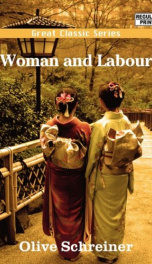
Woman and Labour
Series:
Unknown
Year:
Unknown
Raiting:
5/5
It is- what its name implies- a collection of musings on some of the points connected with woman¿s work.' (From original Introduction) --This text refers to an alternate Paperback edition.
Show more
add to favoritesadd In favorites

Trooper Peter Halket of Mashonaland
Series:
Unknown
Year:
Unknown
Raiting:
3.5/5
Short excerpt: It was a dark night; a chill breath was coming from the east; not enough to disturb the blaze of Trooper Peter Halket¿s fire yet enough to make it quiver.
Show more
add to favoritesadd In favorites
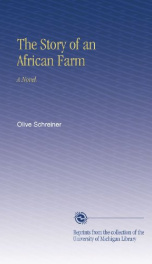
The Story of an African Farm, a novel
Series:
Unknown
Year:
Unknown
Raiting:
5/5
First published in 1883, this book quickly became the best-seller. When it was found out that under the pseudonym Ralph Iron hid the woman, Olive Schreiner, it caused a lot of controversies… and so The Story of an African Farm became the first feminist novel. It tells us a story of three characters, first children and then adults, two of them (Waldo and Lyndall) are recognized as prototypes of the author, they reflect her views and thoughts.
Reading this wonderful novel, you will plunge into captivating atmosphere of Nineteenth century. Show more
add to favoritesadd In favorites
Reading this wonderful novel, you will plunge into captivating atmosphere of Nineteenth century. Show more
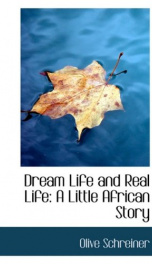
Dream Life and Real Life; a little African story
Series:
Unknown
Year:
Unknown
Raiting:
4/5
Academy Chicago PB, 1981 printing, reprint of 1909 edtion; near like new save for gift inscription on flyleaf.
Show more
add to favoritesadd In favorites
What readers are saying
What do you think? Write your own comment on this author!
write a commentif you like Schreiner Olive try:
readers also enjoyed
What readers are saying
What do you think? Write your own comment on this author!
write a commentGenre
if you like Schreiner Olive try:
readers also enjoyed
Do you want to read a book that interests you? It’s EASY!
Create an account and send a request for reading to other users on the Webpage of the book!
